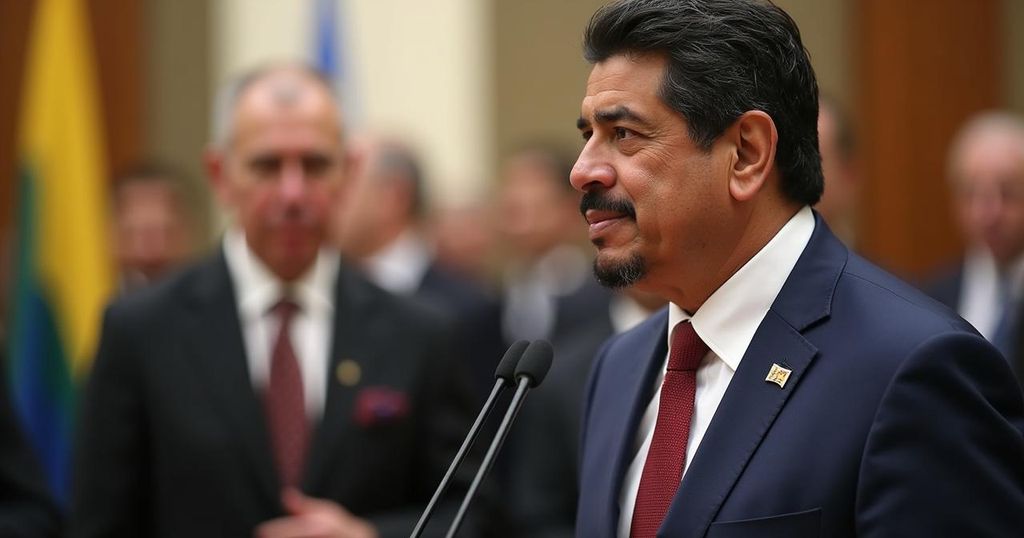SVG PM Gonsalves Advocates for Maduro as Beneficial for Guyana’s Oil Sector

Dr. Ralph Gonsalves, Prime Minister of Saint Vincent and the Grenadines, advocates that Nicolas Maduro’s presidency is advantageous for Guyana’s oil sector. He underscores the importance of dialogue over military conflict and critiques U.S. historical involvement in Latin American politics. Gonsalves’s stance reflects the need for stability and regional cooperation amidst evolving geopolitical dynamics.
The Prime Minister of Saint Vincent and the Grenadines, Dr. Ralph Gonsalves, has asserted that the presidency of Nicolas Maduro in Venezuela benefits the interests of Guyana, particularly regarding its burgeoning oil sector. During his recent visit to Guyana to pay respects at the funeral of Sir Shridath Ramphal, a prominent Guyanese statesman, Dr. Gonsalves expressed his belief that the Venezuelan populace, by rejecting the right-wing opposition, has ensured greater security for Guyana’s oil industry. He remarked, “If you have a choice between Maduro and the right wing in Venezuela, I advise you to choose Maduro. The right wing will seek to allow the Americans to take the oil in Venezuela, to set up to take over PDVSA (the state oil company) and try to run Guyana’s oil industry from Caracas.” Dr. Gonsalves, who was the first Caribbean leader to congratulate Maduro following the July elections, reiterated his commitment to peaceful resolutions concerning territorial disputes. “Anytime, if Venezuela attempts to do anything militarily, you’ll hear that I speak against it… Under anybody. No war. You have a problem, you talk about it, you solve it,” he stated, underscoring his preference for dialogue over conflict. In fostering diplomatic ties, Saint Vincent and the Grenadines and Brazil have facilitated dialogue between the leaders of Guyana and Venezuela, leading to the Argyle Declaration for Dialogue and Peace. Dr. Gonsalves criticized the historical aggression of Venezuela’s right-wing factions towards Guyana, particularly regarding the Essequibo Region, and pointed out their attempts to undermine Maduro’s leadership through claims of needing to negotiate under pressure. In defending his assertion that the recent elections in Venezuela were fair, he referred to the U.S.’s tumultuous history regarding democracy in Latin America, stating, “America can’t teach me about elections and democracy. In my lifetime, I watched what has happened.” This perspective positions Gonsalves and others against the backdrop of heightened scrutiny of the political landscape in Venezuela by both Guyana and their U.S. allies. Ultimately, while Guyana and Suriname seek verification of the Venezuelan elections and sanction attempts to disrupt democratic processes, accusations towards regional leaders of complicity in perceived election rigging continue to surface. Dr. Gonsalves, amidst these tensions, remains adamant about the importance of peaceful dialogue and supports Maduro’s regime for the strategic well-being of Guyana’s evolving oil market.
The article addresses the political dynamics between Venezuela and Guyana, particularly in light of the ongoing development of Guyana’s oil sector. The stance taken by Prime Minister Ralph Gonsalves relates to broader regional issues, including the influence of U.S. foreign policy in Latin America and historical relations among Caribbean nations. The item encapsulates Gonsalves’ views on the implications of Maduro’s presidency for regional security and economic interests, contrasting the ideologies of leftist governments with right-wing opposition forces in Venezuela.
In conclusion, Prime Minister Dr. Ralph Gonsalves has articulated a perspective that positions Maduro’s leadership as beneficial to the Guyanese oil sector amidst regional tensions and U.S. influence. His advocacy for peaceful engagement, coupled with a critique of historical U.S. interventions in Latin American democracies, underscores a complex interplay of politics in the Caribbean region, reflecting a preference for stability in diplomatic relations with Venezuela.
Original Source: caribbean.loopnews.com







